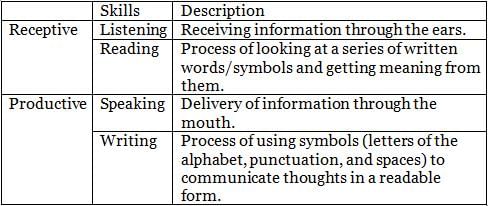Test: HP TGT Psychology Mock - 4 - Software Development MCQ
30 Questions MCQ Test - Test: HP TGT Psychology Mock - 4
Which among the following not supported the word ‘comprehensive’ in the scheme of continuous and comprehensive evaluation ?
Which of the following is not correct regarding teaching-learning process?
If a child has poor handwriting, lack of confidence, Ianguage problem etc. the child may have:
Alternate conceptions and misconceptions hold by children represent:
There are lot of debates all around whether girls and boys have specific set of abilities due to their genetic materials. In this context which among below option is most agreeable?
Which of the following is correct regarding emotion ?
As a teacher, what will you do if students do not attend your class?
Which of the following question asked by the teacher encourages creativity and problem-solving skills among children?
In Gagne’s learning hierarchy which of the following is the highest type of learning?
Assertion (A): A teacher should encourage students to verbalise their thoughts while working on a problem.
Reason (R): Private speech facilitates cognitive development of children.
Choose the correct option:
Students are engaged in the classroom through different learning tasks. This phase is known as:
The success of a diagnostic test depends on ___________________________.
1) time and interval of teaching learning
2) rules of grammar
3) diagnostic teaching and material
4) identifying the cause of learning gaps
A child in school is called a problem child when:
Cognitive engagement of children within a constructive classroom can be facilitated by:
(i) Children's talk
(ii) Emotions of a teacher
(iii) Positive interpersonal relationships among children
(iv) Externally imposed discipline
Which one of these factors plays a very important role in learning?
Which one of the following is an example of authentic listening?
1) Reading aloud
2) Story telling
3) Radio broadcast
4) Singing a song
Which of the following statements about students’ errors is correct?
To deal with misconceptions among students, a teacher should:
Factors which affect a child's physical growth and development are:
Which of the following example shows that intrinsic motivation is better than extrinsic motivation for learning?
Visual-spatial dysfunction is a __________ disability.
Which of the following factors influence learning?
(i) emotional
(ii) cultural content
(iii) maturation
(iv) interest
Which of the following emotions are students likely to experience when outcome is uncertain and focus is on failure?
The evidence on latent learning became the basis of formulating which theory/model of learning?
Given below are two statements, one leveled as Assertion (A) and the other leveled as Reason (R) :
Assertion (A) - At first, the child starts listening to the sounds then observes how people speak, and then later development of reading and writing skills takes place.
Reasoning (R) - The four basic language skills and their natural order are reading-writing-listening-speaking.





















